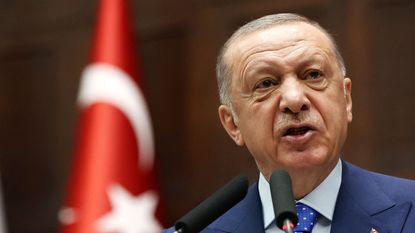Turkey holds Finland and Sweden hostage over Nato bids
Swedish PM refuses to meet concessions around deporting alleged terrorists

Sweden has set itself on a collision course with Turkey after the new centre-right government refused to meet the conditions required for approval of its application to join Nato.
Speaking at a Swedish defence summit on the weekend, the country’s new prime minister, Ulf Kristersson, said concessions had been made but now Turkey wanted “things that we can’t and won’t give them”.
Last summer in the wake of Russia’s invasion of Ukraine, Turkish President Recep Tayyip Erdoğan initially blocked plans to fast-track Finland and Sweden’s applications, demanding the two countries renounce their support for Kurdish “terrorist” organisations before joining the military alliance.
Subscribe to The Week
Escape your echo chamber. Get the facts behind the news, plus analysis from multiple perspectives.

Sign up for The Week's Free Newsletters
From our morning news briefing to a weekly Good News Newsletter, get the best of The Week delivered directly to your inbox.
From our morning news briefing to a weekly Good News Newsletter, get the best of The Week delivered directly to your inbox.
What concessions have Sweden and Finland made to Turkey?
The two Nordic countries have made joining Nato their top foreign policy objective. However, Turkey, which joined Nato during the alliance’s second expansion in 1952, opposed Finland and Sweden’s membership because of its long-standing allegation that Helsinki and Stockholm back “terrorist organisations” in Iraq and Syria.
It referred to the countries’ support for two Kurdish militias in the Middle East: the Kurdistan Workers’ Party (PKK) and People’s Defence Units (YPG).
The YPG “spearheaded the campaign against Isis in Syria”, the Financial Times (FT) said, receiving “weapons and training from the US-led anti-Isis coalition”. This was “supported by Sweden”, which has a large Kurdish diaspora of some 100,000 people.
The group, however, has close ties with the PKK, which has “waged a bloody armed struggle against the Turkish state since the 1980s” and has been “recognised as a terrorist organisation by Sweden as well as the EU and the US”, said the newspaper.
Sign up for Today's Best Articles in your inbox
A free daily email with the biggest news stories of the day – and the best features from TheWeek.com
Western backing for “groups that are affiliated” with the PKK has “long been a source of anger in Turkey”, the FT added, “both among officials and the public”.
However, under a new three-way agreement signed last July, Finland and Sweden confirmed they would not support the YPG/PYD, and the group known in Turkey as FETO, and stated that they deemed the PKK “a proscribed terrorist organisation”.
Finland has also agreed to reconsider an embargo on weapons exports to Turkey, following a similar move by Sweden last year. Allowing permits for arms exports was interrupted in 2019 due to Turkey’s military operation in Syria against Kurdish fighters, but on Monday Finnish Defence Minister Antti Kaikkonen implied that “in principle and in theory”, such a ban on arms sales no longer exists.
Euractiv said “allowing arms to be sold to Turkey again could be beneficial to Finland’s hopes of quicker ratification of its Nato application”.
So what is the hold up?
Reuters reported that Ankara has “expressed disappointment with a decision late last year from Sweden’s top court to stop a request to extradite a journalist with alleged links to Islamic scholar Fetullah Gulen, blamed by Turkey for an attempted coup”.
Kristersson insisted that while Sweden was living up to commitments made last July, it had to follow the law on deportations, “which is a judicial process in Sweden with no role for the government”, reported the FT’s Nordic and Baltic correspondent Richard Milne.
Opinion polls have shown Swedes do not favour offering too many concessions to Turkey. In a survey for daily newspaper Dagens Nyheter last week, 79% of the public said they wanted Sweden to stand up for the rule of law even if that delayed its Nato membership.
When will Sweden and Finland’s bids be approved?
The Nordic countries’ application has already been approved by 28 out of the 30 existing Nato members, with Hungary’s parliament expected to ratify their membership in the coming weeks.
However, France24 said Erdogan is expected to hold firm and “is unlikely to retract its condition, at least not before the all-important presidential elections scheduled in June”.
That a Nato member “close to the abyss in any assessment of human rights and democracy measurements, prevents two of the most democratic countries in the world from getting the protection they deserve” is both “ridiculous and incomprehensible” said former NBA player turned Turkish human rights activist Enes Kanter Freedom in TIME magazine.
“This despite the fact that, as a Nato member, it should be clear that the expansion of Nato to include Finland and Sweden will put Nato in a stronger position. With enlargement, the Baltic Sea becomes almost a Nato lake,” he added.
It means the “Swedish-Turkish tug of war is set to continue”, said France24. However, the news service said, “perhaps the most revealing statement at that Swedish defence conference was not Kristersson’s refusal to override the Supreme Court – but rather Nato Secretary-General Jens Stoltenberg’s suggestion that the alliance has already extended its security umbrella to the two Scandinavian countries”.
“It is inconceivable that Nato would not act if the security of Sweden and Finland were threatened,” he said.
Create an account with the same email registered to your subscription to unlock access.
-
 5 high-caliber cartoons about Kristi Noem shooting her puppy
5 high-caliber cartoons about Kristi Noem shooting her puppyCartoons Artists take on the rainbow bridge, a farm upstate, and more
By The Week US Published
-
 The Week Unwrapped: Why is the world running low on blood?
The Week Unwrapped: Why is the world running low on blood?Podcast Scientists believe universal donor blood is within reach – plus, the row over an immersive D-Day simulation, and an Ozempic faux pas
By The Week Staff Published
-
 Rishi Sunak's asylum spat with Ireland explained
Rishi Sunak's asylum spat with Ireland explainedIn Depth Irish government plans to override court ruling that the UK is unsafe for asylum seekers
By The Week UK Published
-
 How would we know if World War Three had started?
How would we know if World War Three had started?Today's Big Question With conflicts in Ukraine, Middle East, Africa and Asia-Pacific, the 'spark' that could ignite all-out war 'already exists'
By Harriet Marsden, The Week UK Published
-
 The issue of women and conscription
The issue of women and conscriptionUnder the radar Ukraine military adviser hints at widening draft to women, as other countries weigh defence options amid global insecurity
By Harriet Marsden, The Week UK Published
-
 Ukraine's unconventional approach to reconstruction
Ukraine's unconventional approach to reconstructionUnder the radar Digitally savvy nation uses popular app to file compensation claims, access funds and rebuild destroyed homes
By Harriet Marsden, The Week UK Published
-
 What does victory now look like for Ukraine?
What does victory now look like for Ukraine?Today's Big Question Not losing is as important as winning as the tide turns in Russia's favour again
By Elliott Goat, The Week UK Published
-
 Will Ukraine's leadership reset work?
Will Ukraine's leadership reset work?Today's Big Question Zelenskyy hints at ousting of popular military chief, but risks backlash amid dwindling munitions, delayed funding and Russian bombardment
By Harriet Marsden, The Week UK Published
-
 Imran Khan sentenced to 10 years: how powerful is Pakistan's military?
Imran Khan sentenced to 10 years: how powerful is Pakistan's military?Today's Big Question The country's armed forces ignore country's economic woes, control its institutions and, critics say, engineer election results
By Harriet Marsden, The Week UK Published
-
 What is Iran's endgame?
What is Iran's endgame?Today's Big Question Tehran seeks to supplant US and Saudi Arabia as dominant power in Middle East while forcing Israel to end Gaza war
By Harriet Marsden, The Week UK Published
-
 Israel proposes two-month pause in Gaza war in exchange for all Hamas hostages
Israel proposes two-month pause in Gaza war in exchange for all Hamas hostagesSpeed Read Deal doesn't include an agreement to end war, but might be 'the only path that could lead to a ceasefire', said US officials
By Harriet Marsden, The Week UK Published